Todd: In this interview we're going to talk about you.
Brian: Okay, something that I'm familiar with.
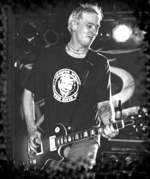 T: I'm from Northern Virginia so I grew up with Minor Threat, ever since you were 15, which is really cool to see you starting out and now with Bad Religion. It's this big circle. Going to the Wilson Center and then all this. So my first question is, it seems that you've been in a lot of bands since you were 15. Is that basically what you've wanted to do? Or was it a hobby?
T: I'm from Northern Virginia so I grew up with Minor Threat, ever since you were 15, which is really cool to see you starting out and now with Bad Religion. It's this big circle. Going to the Wilson Center and then all this. So my first question is, it seems that you've been in a lot of bands since you were 15. Is that basically what you've wanted to do? Or was it a hobby?
B: It was a hobby and a form of expressions. I wasn't aware that I was a professional musician until I had been living off of it for about seven years. I mean I was living in a group house as a professional musician and making a very small income but it didn't even occur to me that I had been doing just that. My existence had been purely to focus on music, and my job history once I got out of high school was, well in retrospect, I didn't realize that I only took jobs that were transient. I was a motorcycle courier so that I could always go on tour. Or I would pretend to go to college for a semester so that I could go on tour and use the money my parents gave me for the semester to make t-shirts to sell, which I think is a much better education than I could have had at George Washington University. I mean, Jesus Christ, they'll let anybody in there! (Wink wink)
T: How did your parents react to that?
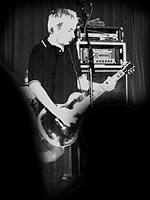 B: The information that I had spent tuition money on t-shirts? I withheld that information for a decade until I was well ensconced in my new lifestyle where all is forgiven and they were right about me all along all of a sudden; isn't that interesting?
B: The information that I had spent tuition money on t-shirts? I withheld that information for a decade until I was well ensconced in my new lifestyle where all is forgiven and they were right about me all along all of a sudden; isn't that interesting?
T: For all the bands you were in-Government Issue, Meatmen, Minor Threat, Dag Nasty, Junkyard, was that transient?
B: It's not because I'm difficult, I'll tell you that much right now! No, everything had it's combination. Minor Threat broke up the first time because we hated each other because we were children, our guitar player was going to college, and we thought you were supposed to do that. So, I joined Government Issue because I was not of college-age yet and GI was, in my opinion, the next best band in Washington and an opening happened to be there, so I took it. Then when Minor Threat decided to get back together, of course, I immediately left GI. Minor Threat broke up again for personal issues but not really so much against each other, we were kind of bored with the whole thing and still had no scope or concept of what we were doing. Plus, it wasn't going to matter to anybody 15 years later. It was still just our band. The Meatmen I was in but I was also in college at that time, screwing around, playing in the Meatmen as a thing. I mean, I was in the band but I only played six shows and I did one record. Now people think that I was in the Meatmen, you know, their body of work which was eight albums. It was a favor for Tesko who was a friend of mine. For Doggy Style, same thing, Brad and Lewis were friends of mine. Doug was going to do Dag Nasty with me so I was in California and as a favor, I played with them so it's not quite as much jumping around as it seems. It's really Minor Threat, Dag Nasty, Junkyard and Bad Religion. Those are the four bands that I was a full member of and was part of my vision, my songwriting, and my ideas that I contributed to.
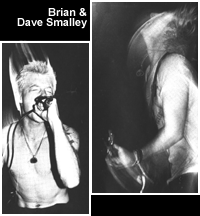 T: Now in Dag Nasty, there were different incarnations. There was Sean (Brown), Dave Smalley and Peter Cortner.
T: Now in Dag Nasty, there were different incarnations. There was Sean (Brown), Dave Smalley and Peter Cortner.
B: Sean was fired when Dave said he wanted to do it because Dave Smalley is a great singer and had a great history but then Dave left me flat on my ass; he just quit to go move to Israel with his girlfriend. I already had a tour booked with the Descendants on the Enjoy Tour which was the coup of the century and I said "I'm going on this fucking tour." So I got Peter Cortner and that's how that happened.
T: So, which incarnation did you personally like?
B: Across the board, the songwriting was much better with Peter but there are elements of the album "Can I Say" that I think are the finest moments. I would pick Peter because he was around for so many really great songs. What should have happened was Smalley shouldn't have quit and you would be talking to Kurt Cobain right now rather than some fat ass punk rock guy right now. I mean, if that "Can I Say" band worked out, it would have been a really kick ass band. I had no regrets how things turned out but I mean, Dag Nasty was my most personal thing. It was my band-I wrote the songs, the lyrics, drew the pictures, I did everything! It kind of hurt not to see how it did, what it should have done.
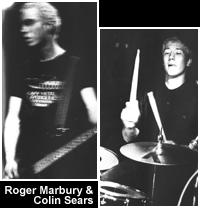 T: Now it seems that everything has come full circle. You are in Bad Religion; the band is kind of an icon of west coast punk rock to everything else. With you joining the band, it married the east coast sound with the west coast sound.
T: Now it seems that everything has come full circle. You are in Bad Religion; the band is kind of an icon of west coast punk rock to everything else. With you joining the band, it married the east coast sound with the west coast sound.
B: It's the Greg Hetson, Brian Baker thing. It�s an east cost versus west coast thing� There is the west coast style which he pioneered� you know he's an incredible guitarist. Though I did not pioneer what I do, I was doing it a long time ago, so the combination of the two is really a nice marriage.
T: It really fits well.
B: Yeah, it's experience, we've both been doing it, I mean, you can't devalue experience, man, I don't want to sound like my parents� but God (laughs). There are so many things I learned.
T: When you worked on the Ric Ocasek album, how was that?
B: When we did the Gray Race, half way through, Ric said "would you like to play on my album? I'm going to do a record soon." I said, "of course". I thanked him and never expected to hear from him. I ran into him a couple of time after the Gray Race, he didn't say anything about it. Then about a year later, he calls me at my hotel, I'm on tour in Portland or somewhere and he goes "It�s Ric". I said, "who?"
B: Well, that's why he picked us because it was everyone he produced. I mean, he did one song with Hole and loved the way Melissa Auf der Maur played, and Ira from Nada Surf. He had the advantage to test market everyone which was great.
T: Did you like going on tour with him?
B: He doesn't have to do anything. If he wants to do six shows, he does them. Europe? Maybe, be he was about to become a father so�
T: What's going to happen now with the Warped Tour?
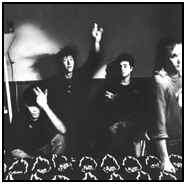 B: Hey, yes. I'm on the Warped Tour. I've got a serious priority system, but Ric is flexible and understanding. "I'll go when you can go". He's great like that. That's the kind of guy he is. Totally down to earth. Some would think he's one of those Depeche Mode types, by the way he looks, but Ric is really a cool guy.
B: Hey, yes. I'm on the Warped Tour. I've got a serious priority system, but Ric is flexible and understanding. "I'll go when you can go". He's great like that. That's the kind of guy he is. Totally down to earth. Some would think he's one of those Depeche Mode types, by the way he looks, but Ric is really a cool guy.
T: When you were in Junkyard, that was somewhat a departure from your style of doing stuff.
B: Well, did you catch Dag Nasty on the Field Day Tour?
T: I saw you early on through the Cortiner Days.
B: By the end of the Cortiner Period, I had hair down to here, I already had tattoos, I was playing two Marshall stacks with a wireless guitar, and I was really, REALLY into fucking Motorhead, Metallica, and Black Flag and The Damned. If you listen to Field Day, even though the mix is atrocious, if you pay attention to the guitar playing, the metal squeaking. I was dying to play that style of music, so under the circumstances, it was complete serendipity. I'm sitting in L.A, Doug quits Dag Nasty, I'm with the drummer, Peters back in DC, none of us have jobs. We're either going to find another bass player and write a new record. I run across the street to 7-11 and run into Chris Gates who I haven't seen in ten years. I've known him from the Big Boys and he said that they were looking for a guitar player, would I be interested. I said yes and it was just amazing, so much fun. We sounded like AC/DC, Motorhead, ZZ Top. We played with Motorhead type bands like Circus of Power and that kind of thing, so it was a cool thing. Everything I learned about label politics was from being on Geffen for four years. I wouldn't trade it in for anything. I just wish the records were better. It was a product of the time, of how things were produced then. We didn't know any better. So, it was a learning experience.